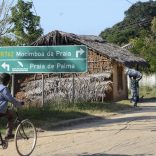Mozambique: Water supply restrictions in Maputo, Matola and Boane
Mozambique: True cost of hidden debts already over 11 billion dollars – AIM report

in file CoM
The scandal of Mozambique’s “hidden debts” has already cost the country at least 11 billion US dollars, and has plunged an additional two million people into poverty, according to a detailed study of the costs and consequences of the debt published on Friday by the anti-corruption NGO, the Centre for Public Integrity (CIP), and its Norwegian partner, the Christian Michelsen Institute..
The term “hidden debts” refers to illicit loans of over two billion US dollars from the banks Credit Suisse and VTB of Russia in 2013 and 2014 to three fraudulent, security–linked Mozambican companies – Proindicus, Ematum (Mozambique Tuna Company), and MAM (Mozambique Asset Management).
The loans were only possible because the government of the day, under the then President Armando Guebuza, issued loan guarantees in violation of the 2013 and 2014 budget laws and the Mozambican constitution. The man who signed the guarantees, former Finance Minister Manuel Chang, is currently languishing in a South African jail, while a legal tussle continues over whether he should be extradited to the US or to Mozambique.
The illicit scheme was largely the brainchild of the Abu Dhabi based group, Privinvest, which became the sole contractor for Proindicus, Ematum and MAM. Privinvest profited from the deal through the vastly inflated prices it charged the Mozambican companies for fishing boats and other assets.
When the company Kroll carried out a forensic audit of the three companies in 2017, it estimated Privinvest’s over-invoicing at more than 700 million US dollars.
United States prosecutors investigating the scandal found that at least 200 million dollars of the loan money was spent on bribes and kickbacks. Among those who received Privinvest bribes were Chang and other senior Mozambican officials, and three Credit Suisse bankers who negotiated the loans, Andrew Pearse, Surjan Singh and Detelvina Subeva. All three have confessed to taking bribes.
The CIP report puts the direct cost of the loans so far incurred, up to and including 2019, at 674.2 million dollars, in payment of interest and capital. If Mozambique is obliged to go on servicing the debts, there will be an additional 3.93 billion dollars to pay up to 2031.
But the indirect costs of the scandal are much higher. The secrecy and corruption surrounding the loans dealt devastating blows to Mozambique’s credibility and reputation.
The report notes that “When rumours about hidden loans began to circulate, Mozambican ministers lied to the IMF and ambassadors of Mozambique’s development partners, denying the existence of any loans. When the Wall Street Journal revealed the hidden debt in April 2016, the anger was extreme. Donors and lenders had kept the country afloat, and they pulled the plug”.
The International Monetary Fund (IMF), angered that the Mozambican government had concealed the true size of its foreign debt, suspended its programme with Mozambique in April 2016. All the 14 donors and funding agencies who had provided Mozambique with direct budget support, suspended further disbursements, and to this day, five years later, they have not resumed.
The loss of this foreign aid in 2016 cost Mozambique 831 million dollars, in comparison with 2015, and these losses have continued to cascade down the years.
The CIP report notes that the ensuing financial crisis meant that “the government became unable to pay its bills, there was a major currency devaluation, foreign debt became unpayable, the economy slowed down sharply, real GDP per capita fell, unemployment soared and poverty increased”.
The report puts a figure on this damage. It calculates the fall in the value of Mozambique’s GDP at 10.7 billion dollars between 2015 and 2019. This is a loss that cannot be recovered, and it will continue to grow, year after year.
The report puts the total economic losses over this four year period at 11.33 billion dollars – or a loss of 403 dollars for every man, woman and child in the country.
The 2016 financial crisis, caused by the hidden debts, precipitated fiscal and monetary instability which sharply reduced public expenditure, notably in health and education. CIP compares the three year average for 2016 to 2018 to the three years prior to the discovery of the hidden debts, and finds that expenditure on health and education fell by 1.7 billion dollars.
In per capita terms, 10 dollars less was spent for each citizen on education and seven dollars less on health care,
The report note that “the sudden rise in inflation in 2016 and rising prices drove 2.6 million people below the threshold of consumption-based poverty”. It estimates that, because of the hidden debt scandal, at least 1.9 million people had fallen below the consumption-based poverty line by 2019.
More difficult to quantify are the political and institutional costs of the scandal. CIP notes that, since 2010, and particularly since 2016, Mozambique’s performance across a range of indices measuring governance, democracy and public financial management has deteriorated.
The report suggest this can be blamed on attempts to cover up and lie about the debt and to seek impunity. It points out that “so far, no one in Mozambique has been held to account and convicted for manifestly illegal actions”.
The system of checks and balances failed. Neither the country’s parliament, the Assembly of the Republic, nor the judiciary proved able to control illegal acts by members of the executive.
The one partial exception was that the Constitutional Council, the country’s highest body in matters of constitutional law, ruled the loans and their guarantees unconstitutional. But the Finance Ministry has ignored this, and has continued to make payments to the bondholders who inherited the original 850 million dollar loan to Ematum. So far the Constitutional Council has not tried to enforce its ruling.
CIP argues that the scandal, and attempted cover-up, led to “worse quality of governance and weakened state institutions, brought the regime and the government into disrepute, and turned Mozambique into a less democratic and more authoritarian country”.












Leave a Reply
Be the First to Comment!
You must be logged in to post a comment.
You must be logged in to post a comment.